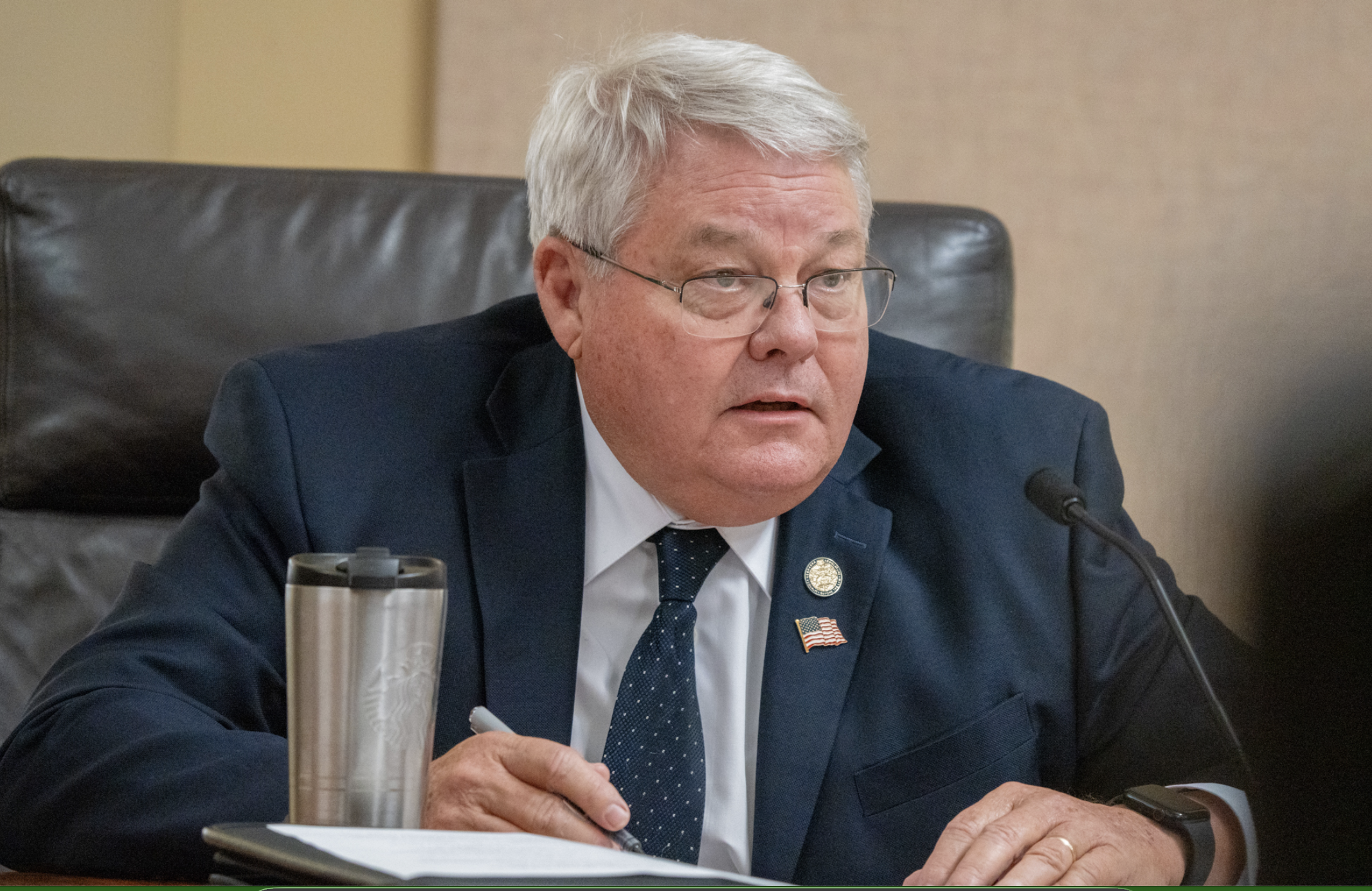
Legislative committee considers interim study on government oversight of abortion providers
By:Erin Bamer
Nebraska Examiner
LINCOLN — A state senator is calling out Nebraska’s Department of Health and Human Services because he believes they have been “totally ineffective” in overseeing local abortion clinics.
He raised the issue this week during a public hearing of the Legislature’s Health and Human Services Committee on several interim studies, including Legislative Resolution 238. That resolution, introduced by State Sen. Rick Holdcroft of Bellevue, examined the quality of patient services at Nebraska abortion clinics and the quality of the state’s oversight of the clinics.
Holdcroft also introduced Legislative Bill 512 earlier this year, which seeks to increase requirements for patients looking to access abortion pills. The bill is pending in the Legislature, waiting on its first round of floor debate. Holdcroft said he intends to focus on the bill during the 2026 session and has no plans to introduce more abortion-related bills next session.
For the hearing and his interim study, Holdcroft did not reach out to either of Nebraska’s two abortion clinics — Planned Parenthood in Omaha and CARE Reproductive Health in Bellevue. He said he “didn’t expect much in return” had he requested information from them.

Instead, his five invited testifiers included representatives from regional and national anti-abortion groups, individuals who filed complaints against abortion clinics with DHHS, a former Planned Parenthood employee and written testimony from Creighton University pharmacy professor Edward DeSimone. Holdcroft mentioned that he also requested a DHHS official testify at the hearing, but he received no response.
Holdcroft and his testifiers made a range of accusations against both clinics, though Holdcroft later told the Nebraska Examiner that the main focus of his concern is the CARE Reproductive Health clinic because it’s located just outside his district in Bellevue.
Multiple testifiers, including Holdcroft, shared suspicions that both clinics worked with providers who lacked the proper licensing to work in Nebraska. Several others accused the Planned Parenthood clinic of having a range of hygienic concerns within the facility, including moldy ceilings, old carpeting stained by blood and other fluids, and one instance of a sewage leak that some testifiers claimed leaked into patient areas.
“There was a gross dereliction of duty by the organization to care for its facilities, patients and employees,” said Mariah Arabalo, a former Planned Parenthood employee who currently works for State Sen. Rita Sanders of Bellevue, who has voted in favor of multiple abortion restrictions, including a total ban.
Meanwhile, Omaha’s Planned Parenthood clinic finished a multi-year $1 million renovation project earlier this year. Erin Wagner, senior director of strategic communications for Planned Parenthood North Central States, said the project has tripled the clinic’s capacity, increasing the number of available exam rooms from four to 12. She said the organization is investing in similar renovations across the country.
Wagner said during the 2024-25 fiscal year, the Omaha clinic saw roughly 4,000 additional patients compared to the previous year. This was partially due to the clinic seeing a rise in out-of-state clients, particularly from Iowa, which passed a bill in 2024 that banned abortions at around six weeks of pregnancy, when an ultrasound detects embryonic cardiac activity. As a result, the number of Iowa patients coming to Nebraska for abortion services rose from 222 in 2023 to 358 in 2024, according to DHHS data.
While Wagner couldn’t speak to every complaint made about conditions at the Omaha clinic, she acknowledged the sewage leak, though she wasn’t sure what specific areas it impacted. She claimed Planned Parenthood officials immediately began working to fix the issue.
“The minute that people were aware it was happening, they were trying to take care of it,” Wagner said.
State Sen. Merv Riepe of Ralston, who sits on the HHS Committee, speculated that Planned Parenthood may go out of business naturally due to staffing issues. A report from The Guardian shared that at least 20 Planned Parenthood clinics have closed this year across seven states, mostly due to financial constraints after they were cut off from federal funding.
While she worked at Planned Parenthood as a nurse, Arabelo said she witnessed a “gaslighting culture” that superiors imposed on employees. If a worker expressed hesitation about participating in a procedure they didn’t feel adequately trained for, she said they were told their refusal would lessen patients’ access to care.
Andi Curry Grubb, executive director of Planned Parenthood Advocates of Nebraska, said staffing has been a challenge, but said it is no more extreme than staffing shortages affecting other medical clinics.
Wagner said new abortion bans that have been implemented in multiple states since 2022 have made it harder to recruit workers. Curry Grubb said it’s additionally challenging that as a nonprofit, the group can’t pay employees as much as they could make at a hospital or other medical centers.
Holdcroft and other testifiers alleged that both the Planned Parenthood clinic and CARE Reproductive Health work with out-of-state medical professionals not licensed in Nebraska. Officials from both clinics denied the allegations.
Holdcroft argued that such out-of-state providers also violate a Nebraska statute that requires physicians who perform an abortion to be available for at least 48 hours to their respective patients, because often they leave the state after supplying their patients with abortion medication.
“If you’re sending a woman home with the intention that she’s going to have a miscarriage in her bathroom in the next 48-72 hours … you need to give her a phone number that she can call for help,” Holdcroft said.
Holdcroft said DHHS officials have claimed the statute doesn’t apply to medication abortions, but Holdcroft argued it applies to all forms of abortion. The statute states that physicians must be available “for a period of at least forty-eight hours for postoperative care,” but the statutory definition of abortion referenced in law is broad and includes abortions via medication.
Wagner said Planned Parenthood offers all patients receiving a medication abortion a 24-hour phone line they can call with any questions or concerns about their symptoms. It’s also their policy to call all patients a week after their appointment, she said.
Most of the testifiers’ main concerns Thursday were that their complaints to DHHS have gone largely unanswered. Matthew Heffron, senior counsel for the nonprofit law firm Thomas More Society, said he submitted a 21-page complaint to DHHS in 2024 which made 229 allegations against the Bellevue clinic.
In response, Heffron claimed DHHS officials told him they investigated just one of his allegations, and the case was quickly closed with no penalties given to the clinic. He said he suspects department officials he communicated with did not even read his complaint.
“This sort of result cannot be the way DHHS oversees health facilities in Nebraska,” Heffron said. “Because if it is, the people of Nebraska cannot trust DHHS.”
Amy Gehrke, chief impact officer for the national nonprofit Center for Client Safety, shared a similar story. She said she filed 12 complaints to DHHS about the Bellevue clinic, and no formal consequences followed.
Gehrke said her nonprofit investigates potential illegalities at abortion clinics across the U.S., and DHHS has been one of the hardest state agencies to work with. She said responses she received from department officials to her complaints were confusing and sometimes contradictory.
When asked by committee member State Sen. John Fredrickson of Omaha, Gehrke clarified that the nonprofit does not investigate possible law violations at crisis pregnancy centers, saying “there’s no need for that.”
Fredrickson noted that a large portion of Nebraska’s government leaders, including Gov. Jim Pillen, Attorney General Mike Hilgers and DHHS CEO Steve Corsi, are vocally anti-abortion. He questioned why they wouldn’t jump on the opportunity to act on these complaints.
“This seems like right up (Corsi’s) alley, to be frank,” Fredrickson said.
In response, both Heffron and Holdcroft said they don’t believe Corsi is responsible for the lack of oversight. Instead, they suspect that lower level employees are controlling these issues. Holdcroft added that investigating clinics falls under DHHS’ purview, not the governor’s or AG’s.
DHHS spokesman Jeff Powell shared a written statement in response to the hearing’s allegations.
“DHHS thoroughly investigates each complaint. Per Neb. Rev. Stat. 38-1,106, all complaints and investigations are confidential,” Powell wrote.
If little changes, Holdcroft said he is considering requesting the new Legislative Oversight Committee to investigate DHHS.
State Sen. Brian Hardin of Gering, chair of the HHS committee and a member of the oversight committee, said he would take the matter to Corsi and committed to pursuing the issue in the oversight committee if there is no progress.
After Nebraska made its abortion ban stricter in 2023, banning the procedure after 12 weeks post-gestation, the percentage of medication abortions jumped to 81%, according to DHHS data. Holdcroft said because of this, the department ought to adjust its oversight to account for this shift.
Although Nebraska’s abortion restrictions are not as extreme as some neighboring states, Curry Grub said the move from a 20-week to a 12-week ban has forced many clients to make decisions faster. Wagner added that it has also prompted Planned Parenthood to increase patient education efforts.
“We’re not going to shy away and back off on what our goals are for increasing access to health care, even if there’s more barriers being put up,” Wagner said.




